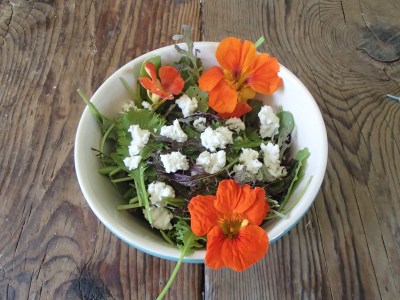
Farmstead Catering began in early 2014 and specializes in full-scale catering directly from their modest farming operation. They primarily cater wedding receptions but do cater other events. By creating a direct connection between farm and chef, and chef to consumer, the business passes on cost savings to wedding couples with a food and environmental conscience.
The company is owned and operated by Dillon Klepetar with help from temporary farmhands, friends and his partner Kelly McQuade.
“Weddings can be extravagant affairs,” says Klepetar, “but they do not need to be damaging to the environment.”

Since opening for business, there has been a flood of demand, according to Klepetar who has been overwhelmed with inquiries.
“Apparently, people have been waiting for this,” adds Klepetar.
Indeed local, sustainably-grown food should not be reserved for home consumption or restaurant fare.
In fact, Farmstead Catering grows and raises food items specifically for the events they cater which means the food is harvested when it is peaking in flavor. They even encourage couples to come visit their wedding food as it is being grown. Klepetar feels that this close relationship between farmer and consumer helps foster the sort of linkages that helped incubate this business idea in the first place.
“Growing food is really a love story—it takes time to mature and can be a lot of hard work at times. You need to stay focused on the end product in the challenging times or else you will give up impulsively.”
Klepetar believes that the food at a wedding should be raised with the same spirit as the occasion.
“The industrial food system is the antithesis of romance,” he adds.

Contact Dillon at 518-265-8570 or check out their website or Facebook page.
A CSA for Your Wedding Day
Wedding couples have the opportunity to select among seasonal menus prepared by Farmstead Catering or to design menus that coincide with their tastes and preferences. With enough lead time, the farm grows every single item used to prepare the menu and flower arrangements with the exception of the coffee, tea, salt and black pepper. When Klepetar cannot grow a particular item, or the growing season has been poor for a particular crop, he will buy the most local, organic item to replace it.

The food is then prepared at the Whallonsburg Grange commercial kitchen and transported to its off-site destination. While the business has only booked buffet-style receptions, they have the capacity to provide a fine dining atmosphere with table service and even outdoor Barbecues.
Klepetar recognizes that this business model has made him an ambassador to farming for couples who have a taste for fresh, local food. For instance, a wedding in July 2014 featured an entrée of lemon-basil chicken. Klepetar sent pictures of the broilers every two weeks to the bride and groom who were thrilled to watch the progress of their wedding menu.
“We aren’t just providing food,” Klepetar says, “we are providing a story.”
Couples have also called on Farmstead Catering to produce wedding decorations that accentuate a farm-to-fork theme. In particular, Klepetar boasts about the birdhouse gourds which can be used to illuminate pathways when a beeswax tea lamp is placed inside of them. They also can provide cornstalks, barn board signs, and other accoutrements.
Farmstead Catering’s Philosophy

By providing nearly all the food from the farm for wedding guests, there is a considerable reduction in carbon pollution associated with wedding fare. In Klepetar’s opinion, the food is also much fresher and full of seasonal flavors. The farm grows heirloom, open-pollinated varieties of produce and flowers for weddings and raises heritage bloodlines of livestock for meat and eggs.
There are no synthetic fertilizers, chemical herbicides, or pesticides used on the farm. The animals are pasture-raised and (rarely) eat organic grain. Klepetar also has a perennial garden and fruit orchard in Gansevoort on family land which accounts for some of the items served at weddings.
In addition to food from the farm, Klepetar has also designed wedding menus which accentuate seasonally-available foraged foods. Wild leeks, morel mushroom, Jerusalem artichokes and black raspberries represent just a sample of the rich wildcrafted offerings. Klepetar claims that connecting to the wild systems of food production sharpens his insights into domestic agriculture.
“Plants and animals are symbiotic in nature and an efficient farming operation should emulate those interdependent processes,” Klepetar explains.
For instance, the goats can eat and clear the grass, the chickens can eat the fly larvae from their waste, the pigs can then till the area, and the seeds planted there are fertilized with chicken, goat, and pig manure.
Where We Fit In

Essex County is home to an explosion in energy surrounding agriculture. Nearby farms have not only been helpful and supportive of our operation, but they have proved to be an inspiration. Full and By, Reber Rock, Essex Farm and many others in our immediate area exhibit a tenacious work ethic that motivates us to achieve that same standard.
Klepetar is in his last year of a PhD in Political Science and will begin teaching (and commuting by boat-bus-bike) at St. Michael’s College in the fall. He pursues farming as a second full-time job.
Klepetar says, “It’s a tough balance, but I hope I can achieve a lifestyle that satisfies all my priorities.”
Next year, he has plans to hire semi-permanent help and establish business partners that can help handle logistics.
Looking for a Home
As the business continues to grow, it will become vital to find a permanent land-holding for producing food. Currently, many of the investments the business is making in the land (financial and time) will be lost when the lease expires. Farmstead Catering is interested in finding permanent farmland to engage in more long-term efforts like soil enhancement, orchard management, and hay production.
